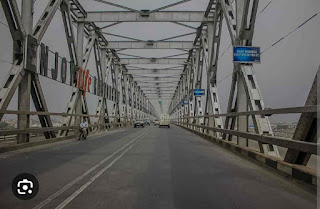Asaba, Ibusa, and Okpanam: A Trio of Delta Capital Territory Settlers with Colonial Names
- Emeka Esogbue
The arrival of the British in the present Anioma Region changed the destiny of the people in different ways with some of the traces still living with the people today. One of the effects of the contact with the Europeans was the change of the names of the African societies and the people of Enuani Nation, an Anioma subgroup are not left out. However, while several African societies have reversed their pre-colonial traditional names, these Enuani communities are stuck with their colonial names. This work presents Asaba, Ibusa, and Okpanam as three sisterly communities renamed by the British.
1. Asaba (Official) and Ahaba (traditional)
Asaba has been the capital of Delta State since 1991 when the state was created but before now, the Anioma city has served as the headquarters of the Southern Nigerian Protectorate. Located on the edge of the majestic River Niger, Asaba was originally named Ahaba until the British who could not pronounce the name effectively Anglicized it to Asaba which it bears today. Although the people of Asaba are not known to be making any official attempt to reverse the Anglicized name to the original traditional name of Ahaba (Ahabam) which means "I have settled," the people sometimes proudly refer to themselves in traditional matters as Ahaba, even praising themselves as "Ahaba Ujom." Asaba is by far, the most popular Anioma community and also the most developed being the state capital. Asaba may be a home of different Nigerian ethnic groups due to its state capital status, the people are no less proud of the Anioma that they are.
2. Ibusa (Official) Igbuzo (Traditional)
Ibusa is a strategically located community, sitting along the road and on a hill that gives it a view of surrounding communities. It is from this geographical arrangement that it derives its traditional name of Igbuzo. Throughout history, the community has derived natural benefits from this geography. They are shielded from external attacks, the difficulty the British would encounter in their Ekumeku exploit as recorded by Major Festin and sent back to the British home government. The bellicose nature of the people with several of the wars fought by them is historically woven in "Isu Warriors." A great number of strategi produced by the people are advantages also garnered from the community's geography. The inter-communal relationship with the various communities surrounding it such as Asaba, Ubulu-Uku, Ogwashi-Uku, Issele-Azagba Okpanam, and others are also due to the contiguity of the settlement. No one expected the British to ably pronounce the name, "Igbuzo," hence the Anglicized "Ibusa" which they officialized in 1914. Since then, the gazetted name stuck. The modern social history of the community has seen the advocacy for the return of Igbuzo by some indigenes.
3. Okpanam (Official) Okpalanwani (Traditional)
Okpanam is often considered one of the trio legs of the capital territory with the other two as Asaba and Ibusa. Although the three communities of Asaba, Ibusa, and Okpanam share different ancestral histories with Asaba and Okpanam more closely, the three communities have fused and synchronized into a mono-cultural society, sharing and enjoying homogeneity in culture. The Enuani dialects of these communities are the same and Omus are Obis, making it the only community where the Omu must go through the 'elili ukwu' rites before becoming one. Surprisingly, these are also the only communities where a female can assume Obiship. In furtherance of shared history, Asaba, Ibusa, and Okpanam, at a point in history diverted from republicanism to quasi-monarchy in which the Asagba would influentially emerge over the multiple Obi system. The Ibusa people would ask from the government, the Obuzo system, and Okpanam would follow suit with the Ugoani arrangement via the white paper. Okpanam is a friendly ground with a history of the accommodation of strangers yet, the most extreme conservatives of their culture, strongly hold to the traditions and customs handed to them by their forefathers. Incidentally, Asaba, Ibusa, and Okpanam have always laid claim to being the first settlers in the Asaba-Ibusa-Okpanam axis. This claim is reflected in Okpalanwani's original name Okpanam and has been retained by the settlement. "Okpala" means the first son and "and" in this sense, means territory. The name would then traditionally suggest Okpanam as the first settlers on the present Asaba-Ibusa-Okpanam axis. It was the British who couldn't pronounce the name that changed it to Okpanam which it bears today. The late Kaduna Nzeogwu seems the most popular figure to hail from Okpanam while the present Omu of the community, HRM Obi Martha Dunkwu is the most popular woman from Okpanam.



Comments
Post a Comment